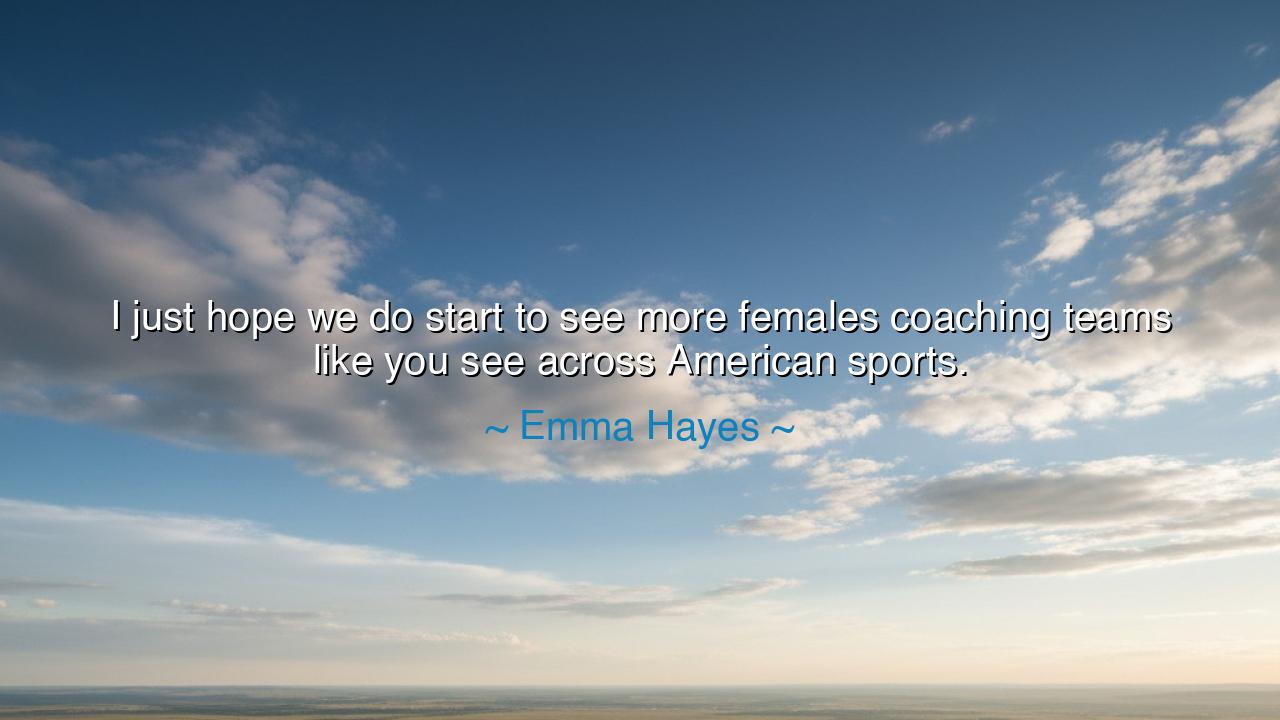
I just hope we do start to see more females coaching teams like
I just hope we do start to see more females coaching teams like you see across American sports.






The words of Emma Hayes are not merely about sport, but about the tides of history: “I just hope we do start to see more females coaching teams like you see across American sports.” In this declaration lies both longing and prophecy — the desire for a world where women are not confined to the sidelines of influence, but stand as commanders of the field, guiding teams, shaping strategy, and embodying leadership. She speaks not of a dream distant, but of a future ready to be born, if only courage and justice walk hand in hand.
The meaning of these words is clear: leadership should not be bound by gender, for wisdom, vision, and courage are not gifts given only to men. The game itself — whether it be football, basketball, or any contest of strength and mind — demands intelligence, discipline, and the power to inspire. These qualities belong to the human spirit, not to the male spirit alone. Hayes reveals the injustice of a world where women, though skilled and capable, are denied their rightful place upon the throne of leadership, even while nations cheer their athletic triumphs.
History is filled with examples of women who led with unmatched strength. Consider Joan of Arc, who, in an age that dismissed women as weak, commanded armies with faith and fire. She bore neither crown nor title, yet her leadership turned the tide of battle and inspired a nation. Though she did not coach a team upon a field, her story shows the same truth Hayes proclaims: that women possess the ability to guide, to teach, to inspire — and that their exclusion is not born of weakness, but of fear and tradition.
In the realm of sport, we can see the shadows of this same struggle. Women have long played, long trained, long triumphed, yet their path to leadership remains narrow. There are glimpses of progress: Becky Hammon breaking into the ranks of the NBA as a coach, leading men with authority and respect; or Kim Ng ascending to general manager of a Major League Baseball team, her vision guiding an entire organization. These pioneers carry the torch that Hayes speaks of — yet the light is still too rare, and the world waits for more.
The origin of Hayes’s words lies in her own life, for she herself has walked the hard road of leadership. As a manager of Chelsea Women, she has carved out a reputation for tactical brilliance, emotional intelligence, and unyielding resilience. She has proven by deed what others only dare to imagine: that a woman can lead with power, that her voice can command both respect and victory. Yet even in her triumph, she longs for others to stand beside her, for the sight of women in coaching to be common, not exceptional.
The lesson here is profound: we must build a world where talent is not caged by prejudice. If a woman has wisdom, let her speak it; if she has strategy, let her command it; if she has vision, let her shape the future. To deny her place is to rob not only her of destiny, but the world of progress. Sport, like life, is a stage where unity and equality must be proven not in words alone, but in deeds.
So let us take action. Encourage young girls not only to play, but to lead. Honor not only their victories on the field, but their voices off it. Challenge the walls of tradition, and create opportunities where before there were none. For as Hayes declares, the presence of women in leadership should not be a rarity to celebrate, but a reality to expect. And in this expectation, the soul of sport — and the soul of society — will find itself renewed.
Thus, the words of Emma Hayes are both a hope and a summons. They call us to envision a future where female coaches are as natural a sight as the rising of the sun, where leadership knows no gender, and where the wisdom of women is woven into the very fabric of the games we love. And so we must not delay — for each generation that waits is a generation denied. Let us sweep aside the old chains and let the fields of play become fields of equality, where all may lead, and all may rise.






AAdministratorAdministrator
Welcome, honored guests. Please leave a comment, we will respond soon